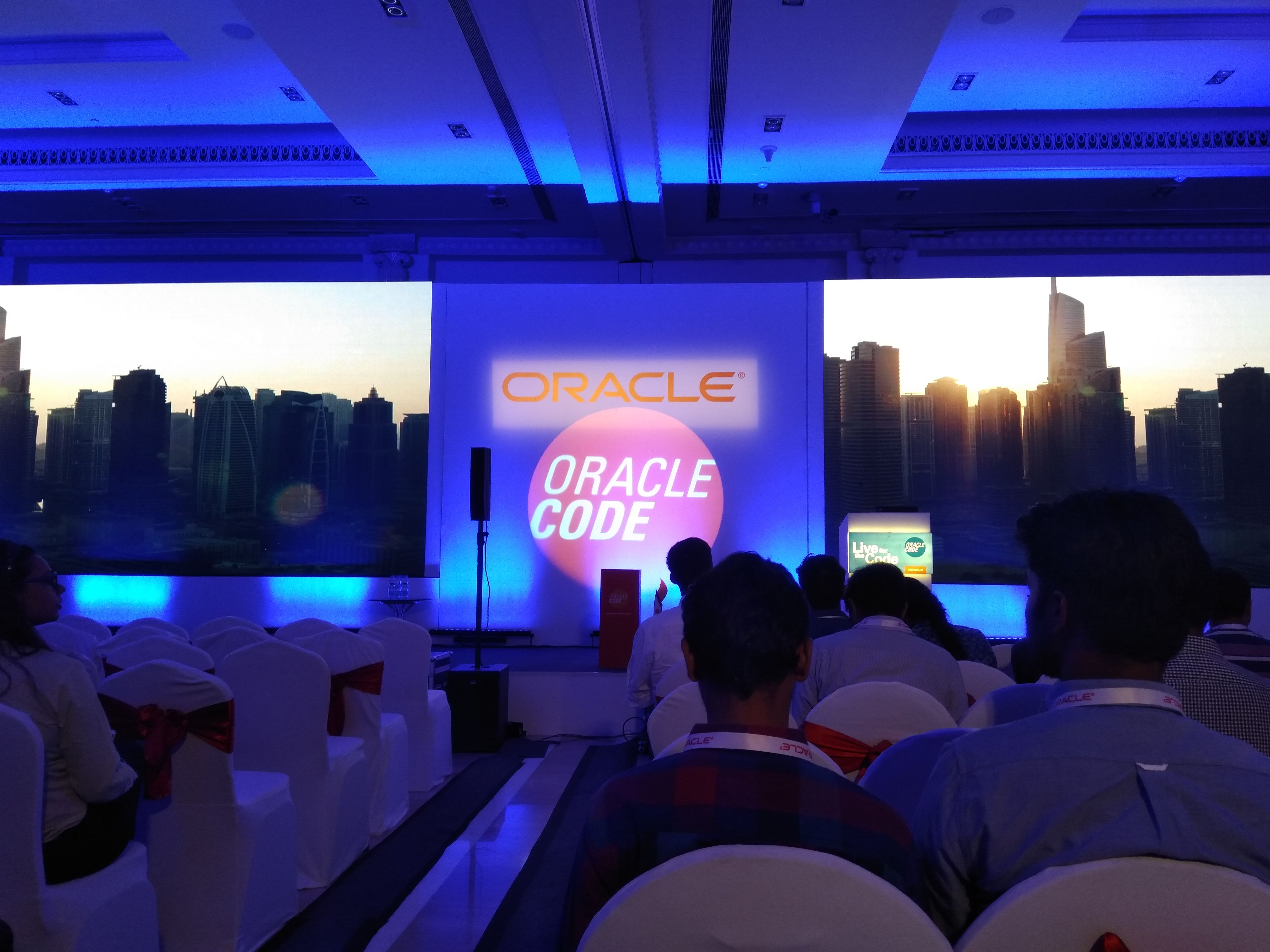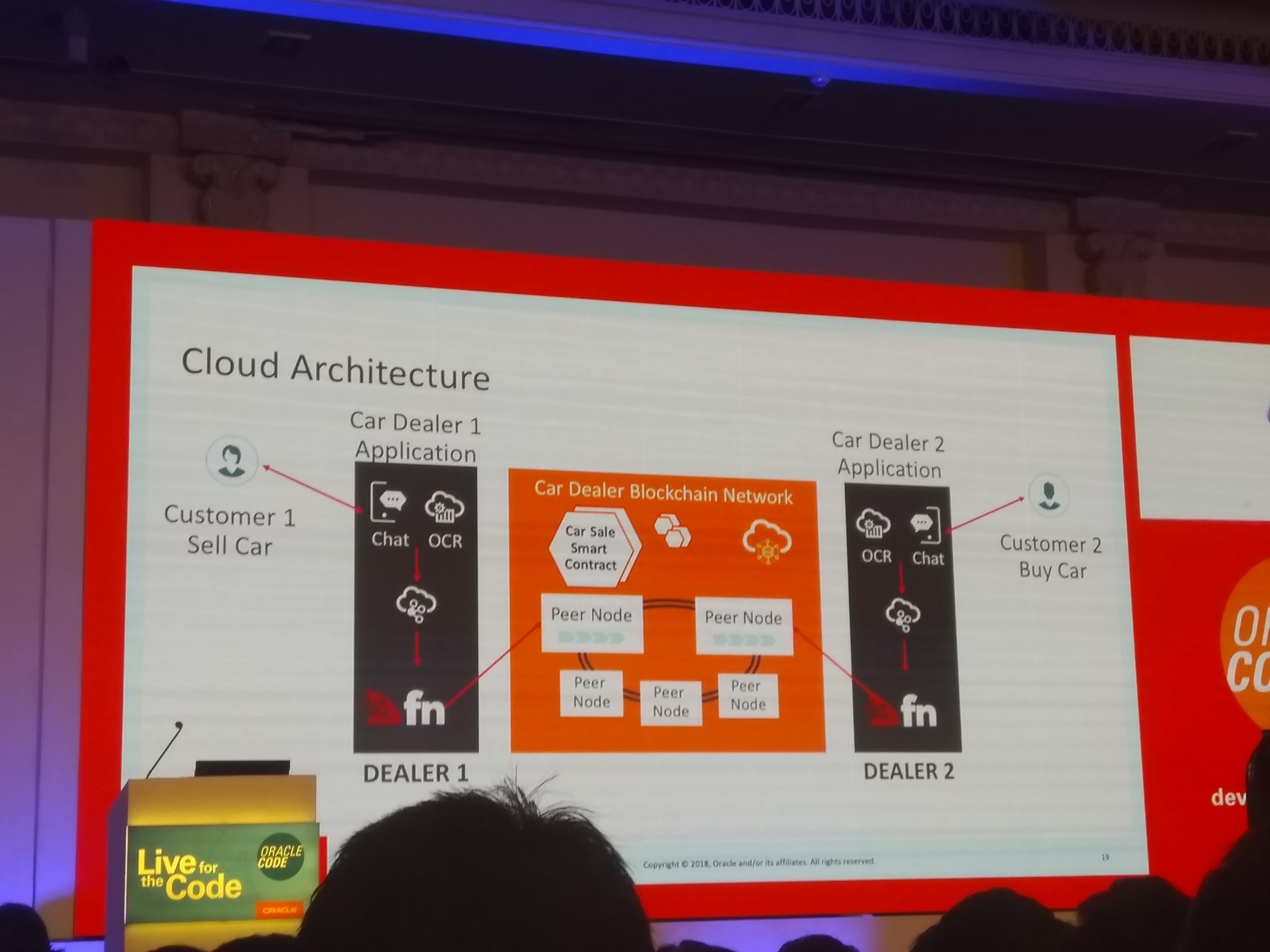Oracle Code Event in Bangalore on 10th April, 2018

I have attended Oracle Code Event in Bangalore which was held on 10th April 2018. The main topic where AI, Machine Learning, Performance, Security etc. There was breakout session too, so I could not attend all the sessions.

The first session was Serverless in the Java Ecosystem where the speaker talked about running your code without provisioning or managing servers. The developer just has to develop the code and not think about the architecture. The developer can call the FAAS (Function as a Service) which are already available or write your own FAAS. The FAAS are a small unit of work and are used for single-purpose. They are also short running and they are stateless.
The second session was "Building a Chatbot Front-end for Blockchain Transactions and Serverless Functions APIs" where users can leverage the Blockchain along with conversational AI by developing chatbots. The Speaker talked about how we can use private Blockchain to create a Car Selling App and use the Chatbot to be the frontend of that app. The whole architecture of the App was shown below:

There were a number of sessions which I attended which was
1 - Using Machine Learning to Make DevSecOps a Reality
Moving toward continuous (or short-cycle) delivery? Constantly rewiring your apps with microservice and similar architectures? How are you planning to maintain visibility, maximize service levels and prevent threats and data loss once this stuff gets into production? Coding instrumentation into your apps is time-consuming and error prone. Instead, let machine learning do the work of adapting your monitoring and security regime to your fast-moving application environments. In this session, we’ll discuss different types of machine learning that are optimized for operational and security data, and how they are leveraged to ensure SecOps moves as fast as the rest of your DevOps pipeline.
2 - Apparently Bots Know It All, but Who Will Deliver Them the Content?
Enterprises need to streamline their message to their customers, vendors, and all the stakeholder. It becomes extremely important for them to maintain consistency and avoid content proliferation. Would you create separate content repositories for each channel such as web, mobile, and business applications? That will create content silos leading to unmanageable synchronization and loss of traceability. How do you prepare for User Interfaces that don’t exist at the time of project inception? Find out how Oracle Content and Experience Cloud Service’s API-first approach allows you to create content just once and deliver it various channels. See how content can be delivered across unforeseeable channels with CEC’s rich set of REST APIs; ChatBots included.
3 - From the Beginning: Your First Node.js Web Service
This session walks through installing Node.js and shows how to create a web service that accesses Oracle Database. We'll even show how to install and configure a database! If you've never done it before, come along and learn how.
4 - Using Oracle Intelligent Bot Service From the Developer Point of View
In this session you will learn the development part of the Oracle Intelligent Bot service. You will learn how to: 1. Create a conversation using YAML 2. How to create an integration with an external application via APIs calls 3. How to integrate the bot with Facebook 4. How to integrate our bot with an OAuth service, for example: Linkedin 5. How to create mini application within the bot During the session we will highlight the developer side of building a bot with Oracle Intelligent Bot service. The main objective is to have a session where the developer can learn their role in this brand new service from Oracle and relate with it in such a way that they can start budiling chatbots right away.
5 - Monitor and Troubleshoot Web and Mobile Application Performance
In this session learn how Oracle Application Performance Monitoring Cloud Service and Oracle Log Analytics Cloud Service provide development and operations teams with the information they need to find and fix their web and mobile application issues fast. All end-user and application performance information (with associated application logs) are brought together into Oracle Management Cloud's secure, unified big data platform. Oracle Log Analytics Cloud Service monitors, aggregates, indexes, and analyzes all log data from your applications and infrastructure, enabling users to search, explore, and correlate this data to troubleshoot problems faster, derive operational insight, and make better decisions.
6 - Tips and Tricks to Build High Performance, Highly Available .NET Database Apps
This session walks you through .NET coding best practices and optimization techniques to achieve fast data access performance. Learn how to improve connection management, statement execution, data fetching, data type use, and caching to boost application performance and scalability. Find out how to build highly available applications to replay database requests when a recoverable error makes the database session unavailable. We'll show you how to ensure that end users never experience an error when a database or service is taken offline.
Source : https://developer.oracle.com/code/bengaluru-april-2018